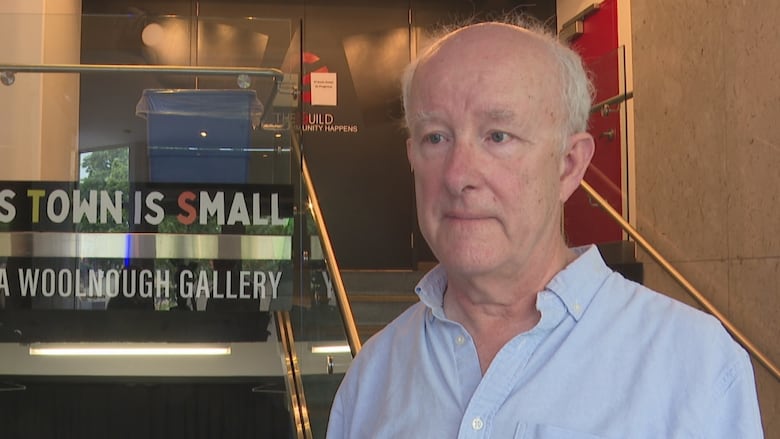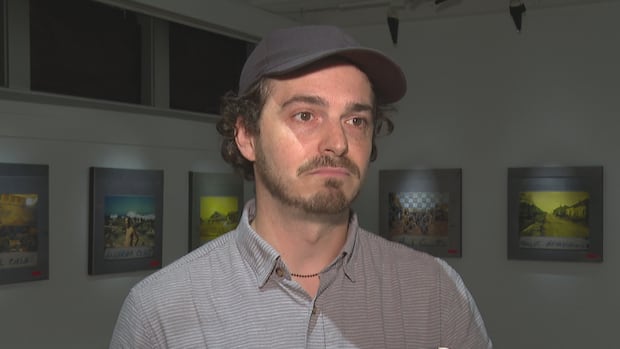Government spending on P.E.I.'s culture sector has dropped sharply, analysis finds
More funding could be 'life-changing' for artists and community, says GM of The Guild

Municipal government, provincial government and educational institution spending on arts and culture in Prince Edward Island has dropped significantly over the past decade and a half, more than in any other province or territory in Canada, according to a new report.
The analysis by Hill Strategies looks at Statistics Canada data on cultural spending by non-federal governments and agencies on the Island.
That includes the P.E.I. provincial government, municipalities and educational institutions, the latter of which includes universities and colleges and school boards.
When adjusted for inflation and population growth, the report found cultural spending on P.E.I. dropped by 62 per cent between 2008-09 and 2023-24 — from $169 per capita to just $63. That's the steepest decline in the country, followed by slides in Alberta and New Brunswick.
"We were all kind of gobsmacked by it," said Mark Sandiford, executive director of Creative P.E.I., which commissioned the analysis.
"Certainly the words have gone through the community, and everybody's trying to make sense of it."
'A slow bleed'
The analysis also finds that in 2023-24, provincial and municipal governments and educational institutions in P.E.I. spent a combined $11 million on culture — just 0.4 per cent of overall government spending.
That percentage ties P.E.I. for second lowest in the country, slightly ahead of New Brunswick. On average, provinces and territories spent 0.8 per cent of their budgets on culture.
Sandiford said the findings help explain why the Island's arts and culture sector has seen little growth lately.

"There aren't any sort of obvious things that have been cut. It's more been just kind of a slow bleed," he said.
He said with limited money, creative projects take much longer to develop. What once could be completed in a year might now drag on for years.
"And oftentimes, with that process, people lose enthusiasm for it. Also, they've got to put food on the table so they get another job," he said. "That's what happens. It just kind of clogs the whole thing up and kind of prevents innovation, prevents growth."
Rethinking art funding model
Sandiford said arts funding supports more than personal creativity; it helps drive tourism and create jobs. He pointed to the Confederation Centre of the Arts in Charlottetown, now undergoing a major renovation, as an example of good investment.
"You have the federal government, provincial government, municipal government working on this big capital project that's going to have impact on the community for years and years and years to come. And it was all done well."
But the benefits go beyond economics.
"It's all part of the quality of life of Islanders," he said. "What happens when you have all these really great things going on is it isn't just a lively atmosphere; it actually helps people's mental well-being."
Sandiford believes governments need to rethink how they view arts funding.
"[If] you start reframing it as an investment, as something that's going to go somewhere and pay off down the road, then it seems to me that makes it a much clearer reason to do it than just sort of saying, 'The arts, we should give them some money,' which has kind of been the attitude in the past."
Arts sector called 'critically underfunded'
Brian Markham, general manager of The Guild arts centre in Charlottetown, echoed Sandiford's concerns.
"The province is critically underfunded in the arts, and that shows in the staffing when it comes to arts organizations," Markham said.
"We are getting more staff in The Guild, but we're still critically understaffed, as are other organizations throughout the province, and we rely heavily on both provincial, federal and municipal funding."

He said many Island artists depend on government grants and sponsorships. Without stable public funding, Markham said artists are forced to spend more time chasing income than focusing on their craft.
"I know most artists on the Island would like to be full-time artists, would like to invest all of their time in that," he said.
"Right now, you're spending, you know, only a quarter of your time actually being an artist, actually working towards that career, while having to hustle to make your money elsewhere."
He added that the funding shortfall means many artists on P.E.I. have been struggling to host residencies, present shows and receive adequate compensation.
He said increasing funding would be "life-changing" for many artists while benefitting the community at large.
"It opens dialogue, which is really important nowadays... just being able to hear different viewpoints. And really, I think art reflects our current situation in the world."
Government response
The province said in a statement to CBC News that it has reviewed the report and believes there may be investments that weren't fully captured in the analysis.
"It is also important to note that this report analyzes spending in Prince Edward Island by both municipal and provincial governments and their agencies, as well as other publicly funded institutions," the statement continues. "It would be inaccurate to represent the spending trend as that of the province's alone."

The province said P.E.I.'s goal is to grow a sustainable art and culture industry as part of its overall economy. To that end, Innovation P.E.I. has invested over $26.4 million into the sector to support fine arts and craft, music, writing, theatre, film, Indigenous arts and more.
The statement said the province has also invested into the sector from "a heritage perspective, as well as workforce development and wage subsidies from the Department of Workforce, Advanced Learning and Population."
It also included provincial investments from the Department of Economic Development, Innovation and Trade, which are listed below:
- 2019-2020: $1,550,448
- 2020-21: $3,874,689
- 2021-22: $6,737,450
- 2022-23: $6,771,296
- 2023-24: $7,480,564
Many demands on 'small tax base'
CBC News also reached out to the City of Charlottetown.
"It's important to note that the cultural categories and definitions used in this report for overall government spending may not align exactly with how other levels categorize arts, culture and heritage spending," a spokesperson responded by email on Monday.
As well, "we have a small tax base and many demands on our tax dollars as a full-service municipality."
That email said arts and culture grants to local organizations that don't have long-standing funding agreements have nearly quadrupled since 2022, and overall spending on the sector rose 150 per cent.
"Overall, the city is moving the needle on arts and culture in a positive direction," the spokesperson said. "In the past few years, we have added a permanent cultural position, and council endorsed a new cultural policy in 2024."
With files from Stacey Janzer
